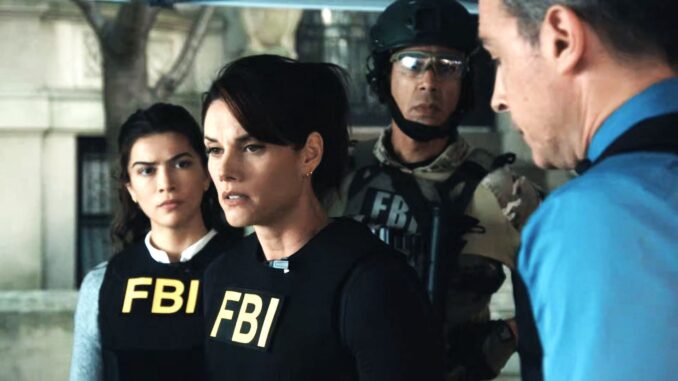
Introduction: A Battle That Hits Close to Home
FBI Season 7 Episode 7 delivers a gut-wrenching and emotional storyline that tackles one of the most pressing issues in today’s society—hate crime. This episode, titled “The Agents’ Battle Against Hate Crime,” doesn’t just entertain; it educates, challenges, and sparks conversation. The FBI team faces off against a hate-driven case that tests their limits and forces them to confront their own biases. If you missed this episode, you’re in for a real treat—one that might make you think twice about the world we live in.
In this detailed recap, we’ll break down the key moments, the thrilling twists, and the lessons learned from the episode that you won’t want to miss.
FBI Season 7 Episode 7: A Quick Overview
The Case:
The episode kicks off with a chilling crime—an assault on a minority group that is suspected to be a hate crime. The agents are immediately thrown into a whirlwind of investigative work, trying to piece together the puzzle before the violence escalates further. The crime is shocking not just for its brutality but also for the clear signs of racial and cultural hatred.
The Team’s Challenge:
As the case unfolds, the agents are forced to confront the ugly reality of hate-driven violence. Each member of the team is tested in different ways, from their professional skills to their personal values. The episode does an excellent job of showing how hate crimes don’t just affect the victims—they impact everyone involved, including the investigators.
The Key Characters and Their Roles in the Episode
Special Agent Maggie Bell: The Emotional Core of the Team
Maggie Bell (played by Missy Peregrym) takes center stage in this episode, showcasing her emotional depth and dedication to justice. As the lead investigator, Maggie’s drive to solve the case is personal—she’s not just seeking justice for the victims, but also for her own understanding of the world. Maggie’s ability to empathize with the victims while maintaining her professional demeanor is one of the highlights of the episode.
Special Agent Omar Adom “OA” Zidan: The Strong, Silent Protector
OA (played by Zeeko Zaki) brings his own unique perspective to the case. As a Muslim agent, he faces personal challenges while investigating a hate crime. His experiences as a member of a minority group give him an added layer of understanding and compassion, making him a powerful force in the investigation. OA’s calm, collected demeanor contrasts well with Maggie’s emotional responses, creating a balanced dynamic on the team.
Assistant Special Agent in Charge Isobel Castille: The Tactical Leader
Isobel (played by Alana de la Garza) is the glue that holds the team together in this high-pressure situation. As the tactical leader, she makes tough decisions, ensuring that the investigation stays on track. Her leadership style is a mix of authority and compassion, which allows her to navigate the complexities of the case with finesse.

The Investigation: Piecing Together the Hate Crime Puzzle
The Initial Clue: A Targeted Attack
The case begins with the brutal assault of a group of individuals from a minority community. The attackers seem to have singled out their victims based on race, religion, or ethnicity, which immediately points to a hate crime. The FBI team starts by gathering evidence from the crime scene, interviewing witnesses, and analyzing any surveillance footage available.
The Twist: A Larger Conspiracy?
As the investigation progresses, the agents discover that the attack may be part of a larger, more organized movement. The hate crime isn’t just an isolated incident—it’s the result of a broader network of hate groups operating under the radar. This revelation adds a layer of complexity to the case, forcing the team to work faster and smarter to prevent further violence.
The Emotional Toll on the Agents
Maggie’s Personal Struggles
Throughout the episode, Maggie is visibly shaken by the case. As a mother and a person deeply committed to social justice, she is horrified by the senseless violence and the underlying hatred that fuels it. Her emotional investment in the case adds a personal dimension to the investigation, making her victories feel even more significant and her setbacks all the more painful.
OA’s Internal Conflict
OA’s experience as a Muslim agent gives him a unique perspective on the case. He is both an investigator and a victim of prejudice, and this dual role makes him especially driven to bring justice to the victims. However, this also creates internal conflict, as OA grapples with the emotional toll of the case and his desire to protect his own community.
Isobel’s Tactical Decisions
Isobel’s role as the tactical leader becomes even more critical in this episode. She must make tough calls that could affect the outcome of the case. The pressure of balancing the needs of the investigation with the safety of the community weighs heavily on her, and viewers can see her struggle to maintain control in such an emotionally charged environment.
The Investigation Unfolds: Key Moments You Can’t Miss
The Breakthrough: A Key Witness Steps Forward
The investigation takes a pivotal turn when a key witness, who was initially too afraid to come forward, decides to share what they know. This moment is a game-changer for the team, as it provides crucial information that leads to the identification of the attackers. The witness’s bravery highlights the importance of community support in solving hate crimes.
The Confrontation: The Agents Face the Perpetrators
In a tense and gripping sequence, the agents confront the perpetrators of the hate crime. The confrontation is not just about making an arrest—it’s about sending a message that hate will not be tolerated. This moment serves as a powerful reminder of the stakes involved in the case and the agents’ unwavering commitment to justice.
The Resolution: Justice Served, but the Fight Continues
The Arrests: A Moment of Triumph
The episode concludes with the successful arrest of the perpetrators, marking a victory for the team. However, this victory is bittersweet. While the agents have brought the criminals to justice, the episode leaves viewers with a lingering sense of the ongoing battle against hate and prejudice.
The Message: A Call for Change
The final moments of the episode deliver a poignant message about the importance of standing up against hate in all its forms. The agents’ victory is a reminder that while justice can be served, the fight against hate is far from over.
Conclusion: Why You Can’t Miss This Episode
FBI Season 7 Episode 7 is more than just a typical crime procedural—it’s a powerful exploration of hate crime, its impact on individuals and communities, and the agents’ relentless pursuit of justice. With its compelling characters, emotional depth, and timely social commentary, this episode is a must-watch for anyone who cares about making the world a better place. The agents’ battle against hate crime is a fight we all need to be a part of, and this episode shows just how much is at stake.
FAQs
1. What is the main theme of FBI Season 7 Episode 7?
The main theme is the battle against hate crime, with a focus on the emotional and professional challenges faced by the FBI agents as they investigate a brutal assault linked to racial and cultural hatred.
2. How does Maggie Bell handle the case emotionally?
Maggie Bell is deeply affected by the case, as she empathizes with the victims and struggles with the personal implications of the hate crime. Her emotional investment adds a layer of depth to her character and the investigation.
3. What role does OA play in the episode?
OA’s personal experience as a member of a minority group gives him a unique perspective on the case. He is both an investigator and a victim of prejudice, which drives him to seek justice for the victims.
4. How does Isobel Castille contribute to the investigation?
Isobel Castille serves as the tactical leader of the team, making crucial decisions that help steer the investigation. Her leadership and ability to stay calm under pressure are essential to solving the case.
5. What message does the episode convey?
The episode emphasizes the importance of standing up against hate and prejudice, highlighting the ongoing battle for justice and equality. It serves as a reminder that while progress can be made, the fight against hate is far from over.